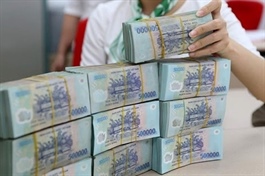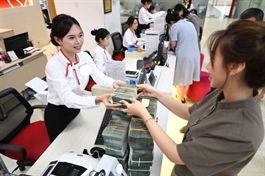Digital assets, carbon credits expected to be collateral in bank loans
Digital assets, carbon credits expected to be collateral in bank loans
Currently, the assets are not yet recognised by Vietnamese law as collateral in bank credit activities, while current regulations mainly apply to tangible assets or traditional financial assets.

View of the conference. Photo thoibaonganhang.vn |
With the strong development of the digital and green economy, a legal framework for recognising digital assets and carbon credits as collateral needs to be considered, as a matter of some urgency, said experts.
If they can be formally recognised as collateral for loans, they will contribute to unleashing the potential of those assets and channeling bank capital into the economy, a conference on banking collateral held in Hà Nội heard yesterday.
The chairman of the Antigua & Barbuda Digital Assets Business Promotion Board and also the Special Economic Envoy for the Prime Minister of Antigua and Barbuda to Singapore, Dr. Giacomo Merello, pointed to the strong showing of digital assets in the local economy.
He said some 17 million Vietnamese held digital assets last year, with a market value of more than US$100 billion. Việt Nam ranked fifth globally in terms of crypto interest and third in exchange use, indicating strong domestic demand.
PhD. Lê Thị Giang from Hà Nội Law University added that there is an urgency to completing a legal framework for digital assets and carbon credits.
Currently, the assets are not yet recognised by Vietnamese law as collateral in bank credit activities, while current regulations mainly apply to tangible assets or traditional financial assets. The lack of a clear legal framework makes it difficult for banks to access this new type of asset, despite its great potential.
Giang believes it is time for digital assets and carbon credits to be officially recognised as collateral in credit transactions. Recognising them only helps expand access to capital for customers but also creates conditions for credit institutions to diversify collateral assets, while contributing to the development of the green financial market and digital economy.
“In the context of globalisation, building a suitable legal framework that is close to international standards will help Việt Nam catch up with global trends, promote cross-border cooperation and enhance national competitiveness,” Giang said.
According to the senior manager of the audit firm KPMG Vietnam’s ESG Division, Dr. Vũ Thị Vân Anh, carbon credits can be used as collateral in loans in Thailand, particularly for climate change adaptation investment projects.
Meanwhile, in the European market, some EU member states such as France have classified EUA (European Union Emissions Certificate) as a transferable intangible asset, allowing it to be used as collateral or security in financial transactions. The European Central Bank (ECB) has implemented measures to reduce climate risks in credit activities, including limiting the use of high-emission assets as collateral, Giang said.
According to Merello, digital and blockchain assets offer new collateral forms but come with novel legal and technical challenges, and regulators worldwide are responding to it, such as Swiss crypro-collateral services or UK property laws.
Merello said as Việt Nam is developing a crypto-assets legal framework, the country can learn from the global experience, such as establishing clear laws on crypto as property or collateral, implementing licensing and custody rules, and encouraging tokenisation (digital bonds) in its planned financial hub.
“As Việt Nam opens its financial centre to crypto, it can adopt best practices to harness this trend safely,” Merello said, noting that any legal framework must address anti-money laundering and counter-terrorist financing (AML/CFT) and tax (e.g. proposed 0.1 per cent crypto tax).
Meanwhile, Giang proposed that the legal status of digital assets and carbon credits should be clearly established, considering them as types of assets in the Civil Code. This is the premise for using these two types of assets as collateral in financial transactions.
In addition, she said, the law needs to supplement specific provisions in the Civil Code and Decree 21/2021/NĐ-CP to recognise digital assets and carbon credits as collateral, and issue detailed instructions on appropriate security measures.
Specific regulations on management, storage, valuation, monitoring and handling of the assets are also needed to ensure transparency, safety and feasibility when using the assets as collateral, Giang said.
- 08:26 29/04/2025




























